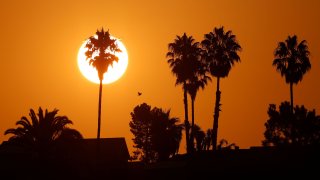
It's 2050.
A climate change worst case scenario has come to pass.
The air is polluted, making you cough. You have to check the air quality before even opening a window. When you do go outside, your eyes water and you have to wear a mask — on bad days, a high tech mask, that is if you can afford it.
Depending where you live, the temperature can be as hot as 140 degrees Fahrenheit for more than a month each year. In public restrooms, you have to pay to use water.
Get South Florida local news, weather forecasts and entertainment stories to your inbox. Sign up for NBC South Florida newsletters.
And there's a mental toll to living in a world that feels like a dangerous obstacle course. People feel bottomless despair and resent previous generations for their lack of action.
This worst case scenario is what life could look like if no progress is made in slowing greenhouse gasses to mitigate climate change, according to Christiana Figueres and Tom Rivett-Carnac in their 2020 book, "The Future We Choose: The Stubborn Optimist's Guide to the Climate Crisis."
Money Report
Staring down two futures
Figueres and Rivett-Carnac, two key architects of the Paris climate agreement, describe a particularly extreme future.
And there is debate among experts as to whether it would be that dire.
For instance, some elements could be more likely than others, says Peter Smith, professor of soils and global change at the University of Aberdeen in Scotland.
"Air pollution and emissions that cause climate change go hand in hand, so less action on climate change will mean poorer air quality," says Smith. "Whether it gets as bad as people having to wear masks by 2050 is debatable, [and] it should be possible to provide clean water without climate action."
But such a situation "isn't outside the realm of a possibility in a worst-case scenario where we refuse, as a civilization, to take meaningful action on climate," says Michael E. Mann, professor of atmospheric science at Penn State and director of the Penn State Earth System Science Center and author of "The New Climate War: The Fight to Take Back Our Planet."
"Do I think that's likely? No — I think we're already seeing positive movement," he says. But "there is much more that needs to be done."
Indeed, to avoid this future, the world must cut greenhouse gas emissions by half every decade, starting now, according to Figueres and Rivett-Carnac, whose Global Optimism organization partnered with Amazon to launch The Climate Pledge.
"So a 50% reduction by 2030, another 50% by 2040, another 50% by 2050," Rivett-Carnac says.
If that happens, the world in 2050 will be very different.
"If we can decarbonize our economy rapidly ... down to near zero by mid-century, we can ... maintain a livable planet and a vibrant economy at the same time," says Mann.
In that future, write Figueres and Rivett-Carnac, city streets will have more trees and fewer cars and Americans can travel via high-speed electric railroads.
Instead of fossil fuels, countries will rely on things like renewable energy (wind, solar, geothermal and hydro), according to the book, while artificial intelligence in machines and appliances will make them more energy efficient.
The air will be "cleaner than it has been since before the Industrial Revolution," the co-authors write.
By and large, people in this future won't eat meat or dairy, according to the book. In fact, "[m]ost young children [will not] believe we used to kill any animals for food," they write.
(Though Mann cautions that implying the onus is on citizens to give up hamburgers rather than on polluters is "unhelpful.")
People will eat locally sourced produce from community farms rather than shopping at large grocery stores, where everything must be shipped far distances to arrive on shelves, write Figueres and Rivett-Carnac.
The dichotomy between Figueres and Rivett-Carnac's versions of 2050 is stark, and that is the point.
"Our future is unwritten," Figueres and Rivett-Carnac write. "It will be shaped by who we choose to be now."
See also:
Paris climate accord leaders: What we do between now and 2030 will impact life for hundreds of years
Inside a lab where scientists recreate the energy of the sun to make nearly unlimited clean energy
6 Black climate change leaders you need to know: 'It is literally a matter of life or death.'
Check out: Meet the middle-aged millennial: Homeowner, debt-burdened and turning 40






